2011
Looking Back at Newest New Things Now Gone
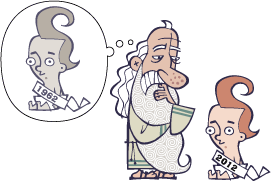
New Year’s is fast approaching. So you can be sure of two things appearing in print and on the web hither, thither and yon: “Best of 2011” lists aplenty and predictions galore.
To do a “Best of 2011” list one had to be paying attention for the last 365 days. Which I haven’t been for most things. Besides rating movies, books, events, and athletes, folks also like to run down the newest new things that appeared in our most recent circuit around the sun. Which would also require one know the latest buzz. I’m afraid I strike out on that, too.
The newest new things I know are not very new. When I think about it, the newest new things I remember do nothing but date me. I remember newest new things anyone under 40 would never think of as ever being a newest new thing. I admit some of these may have begun before my time only to arrive big time later. That’s when they became the newest new thing, so I include them.

At the top of the list is plastic garbage bags. When they first arrived we couldn’t buy them at the store, we got them in 100 count boxes from the fire department. My family got our first color tv in about 1966. Not all shows were in color yet. Ones that were opened with a snippet telling you “The following program is brought to you in living color.” That’s where the NBC peacock came from. As well as the name of the show In Living Color.
While newest new things spring up, old newest new things from before your time die out.
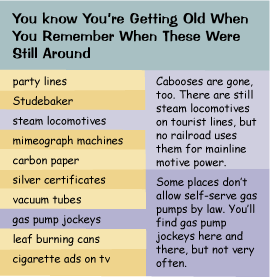
The first item on the list, party lines, might not be familiar to “the youngsters in the audience” as Ed Sullivan used to say. (Dating myself some more.) A party line was when you shared a phone line with another household. If someone called the other person, your phone rang as well. If you were on the phone and they picked up they could listen in on your conversation. If you needed to make a call and they were on the phone, tough luck.
It was a pretty weird deal. Hollywood made a movie based on the trials and tribulations of party lines. Pillow Talk with Doris Day and Rock Hudson. A movie which wouldn’t make sense if you didn’t know about party lines. Anyway, your mother may know. Or your grandmother. Sheesh, I’m getting old.
Filed 12/26/11
Bloody Mess
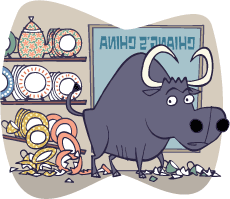
shambles (shăm′ bəlz) noun. 1. a place of great disorder. 2. a place where animals are brought to be slaughtered. 3. any place of slaughter or carnage.
I don’t imagine folks use definition two or three much these days. The bloodletting seems to have gone out of the word. A battlefield would be a shambles. A slaughterhouse would be a shambles, but I can’t remember anyone calling one that.
What’s a little odd, it looks like a plural form of shamble though it’s singular, a shambles. The word shamble is something else altogether. It means to walk in an awkward, usteady manner, shuffling the feet. Though I’ve never heard anyone use the word shamble.
You probably shouldn’t call something a bloody shambles. That’s redundant. Then again, if a slaughter house was hit by a tornado then the shambles would be a shambles. A bull in a china shop might leave it a shambles. A bull in a shambles… that’s another story.
Filed 12/19/11
The Incredible Shrinking Man as He Would Be
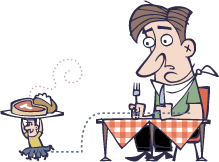
This is purely in the realm of fantasy, but what would it mean if a person shrunk down to an inch tall? In the movie “The Incredible Shrinking Man” we get an idea, only the wrong idea.
In the film the tiny man wants to get down from a table so he rigs a rope, which is string, and climbs down. Thing is, he could have simply jumped down with no problem. Even though he’s really small, the table is still only 30 inches from the floor. The acceleration over a particular distance will be the same regardless of the man’s size. If a full-size man can safely jump down from a table, so can a tiny man.
In fact, a tiny man would be able to jump down more safely than a full-size man. The tiny man has a great deal less mass and so the impact at the same speed will be less. The tiny man is so light and lands with so little force he might be able to jump off the roof safely.
Here’s a personal anecdote to back this up. One day sitting on my back stoop I saw a squirrel fall out of a tree from maybe 20 feet up. It landed with a thump, got up, and ran away back up the tree. A squirrel is so light it doesn’t hit with as much impact as a man would falling 20 feet out of a tree. It also helps the squirrel has a higher strength to weight ratio, which is explained next.
Perhaps you’ve heard about how incredibly strong an ant is because it can lift 10 times its own weight. That is not so incredible, its a matter of its being small. Muscles grow heavier with size at a higher rate than they grow stronger with size. Meaning the bigger and stronger an animal gets the less it can lift relative to its weight.
The reverse is also true, the smaller it gets the more it can lift relative to its weight. The ant is not super strong, it’s incredibly small and thus its strength to weight ratio is high. As it would be for any tiny creature, including a tiny man. A full-size man might weigh 200 pounds and it would be an effort to lift his own weight above his head. The tiny man might weigh a pound, but would have little problem lifting twice his weight above his head. Even so, he’s only lifting two pounds.
The tiny man would also move like a hectic little mouse with very quick steps. When a full-size man takes a step his foot will move about two feet. It takes time to move his foot that distance at a given acceleration. On the other hand the tiny man’s step is a half inch or so. It would take very little time to move his foot that distance at the same acceleration. It’s like a long and short pendulum. In one second the long pendulum makes one stroke, the short pendulum two strokes. Yet they both cover the same distance.
The tiny man could jump up higher relative to his height as well. A house cat can jump several times its height, maybe five or six feet high. A lion would have to jump 15 to 20 feet up to do the same. It can’t. It’s too big and the distance is too far. It’s akin to the pendulums, a matter of acceleration of mass over distance. Distance is not relative, 20 feet is 20 feet no matter how big or small you are.
The tiny man’s voice and hearing would change, too. But I wouldn’t worry about that. I wouldn’t worry about any of this because it’s pretty unlikely to ever happen.
Filed 12/8/11
Hell’s Space Kitchen
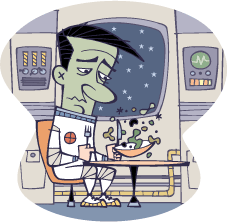
Eating is a pure, primal pleasure. One we experience several times a day, every day, for our entire lives. We do it so often we don’t always appreciate just how pleasurable it is. Sometimes it might be the only really enjoyable thing we do all day.
Of course eating is important. You have to do it to stay alive. Good thing we like to do it. Besides needing food to stay alive, how important to mental health is having tasty food, food we enjoy eating? It turns out it’s pretty important. When eating becomes a chore, something you must do rather than something you enjoy doing… well, it’s not unheard of for sick people to wither away and die because they’ve lost their appetite.
Which brings us to science fiction stories. You know, ones where people eat cubes of processed food and meals in a pill. Where’s the pleasure in that? Would that drive you crazy? Or if not actually batty, would such a diet be depressing? Would it put you off food?
Now we finally come to the fun fact and trivia part.
Having a supply of tasty food is one of the hurdles we face when contemplating long space flights. Even frozen food doesn’t last indefinitely. It turns to unappetizing mush. NASA has found a constant diet of such mush is pretty depressing. A depressed crew… Houston, we have a problem. Space flight is not all rocket science. Sometimes all the little details you never thought of can be a bigger problem than you ever imagined.
Filed 11/21/11
If I Were Delusional, How Would I Know?

“Reality is that which, when you stop believing in it, doesn’t go away.”
—Philip K. Dick
“If a thousand men believe a foolish thing, it’s still a foolish thing.”
—Voltaire
“There are some ideas so wrong that only a very intelligent person could believe them.”
—George Orwell
“The most costly of all follies is to believe passionately in the palpably not true. It is the chief occupation of mankind.”
—H.L. Mencken
“Give me a smart idiot over a stupid genius any day.”
—Sam Goldwyn
Filed 9/21/11
Infrequently Answered Questions
Elephants Can’t Skip
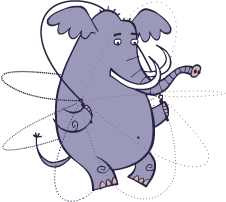
Q: What is the only mammal with four knees?
A: They like to say the elephant, but not really. Depends on what you want to call a knee.
Elephants have the same basic skeletal structure and musculature as other quadrupedal mammals. Though the bone lengths and angles may differ a bit, their legs are built and work the same way. It only looks like elephants have four knees because their legs are fat all the way to the ground, they don’t taper like horses and the like. So a skinny joint on a horse doesn’t look like a knee, but does on an elephant even though they are the same thing.
What IS different about elephants is they are the only four-legged mammal with just one gait. A gait is the order and timing of how the feet hit the ground. Elephants walk, but don’t gallop, trot, pace or canter. They’re just too heavy. Nonetheless with such a big stride a brisk walk can cover a lot of ground pronto.
Being bipedal humans don’t really trot, cantor, pace or gallop either. But we do have two gaits. For people, walking, trotting and running are all different speeds of one gait, where it’s one foot in front of the other equally timed. The second gait is skipping, where you alternate little hops on one foot then the other.
Filed 9/19/11
Man and Superman
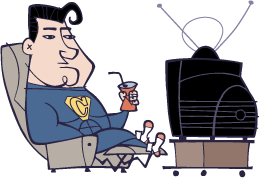
Why do superheros have secret identities? I mean, if you’re Superman why not be Superman all the time? What’s the point of being Clark Kent part of the time? Wouldn’t Superman get more girls than Clark Kent? Wouldn’t Superman get a better-paying job than Clark Kent?
If Superman needed an income he could do a lot better than newspaper reporter. He could hire himself out to NASA to fly satellites into orbit. How much does NASA spend on a rocket launch? A hundred million? Superman could do it for a tenth of that and make out like a bandit. Work once a year, make ten million, save the world in his spare time.
Though maybe I’m looking at it the wrong way around. Is Superman’s secret identity Clark Kent, or is Clark Kent’s secret identity Superman? Then you might ask, why be Superman. Why not be Clark Kent, man of steel?
Then again, maybe both Clark Kent and Superman are secret identities. After all, he was actually an alien from the planet Krypton.
Filed 9/10/11
I Think Therefore I am, I Think
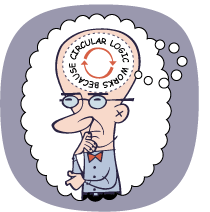
The picture above is my own version of something I saw recently on Zero Hedge. I thought it was pretty funny and so reprised it. Whether this is a quote or a saying or just plagiarism I leave for the reader to decide.
Whatever is the case, there’s no denying it is what it is. Why? Because it is. Is that it? It is.
Filed 8/30/11
Infrequently Answered Questions
The Chicken or the Egg?

Q: Which is more important, nature or nurture?
A: Which is to ask if we are more a product of our genetics or our environment. I don’t know that we can work that out logically or otherwise.
Consider the Spartans, a warrior culture. Young men were raised to be warriors and so became warriors. They were a product of their culture. Still, who created the culture to begin with if not the Spartans? It’s not like the culture was there first and they just fell into it against their will or by accident. I mean, it’s hard to imagine a group of pacifists would found a settlement, develop their customs and ways of living, and then, oops! they’re a warrior culture. Would that happen?
So then, were Spartans warriors because they had a warrior culture, or did they have a warrior culture since Spartans were warriors to begin with? Does culture create people or do people create culture? Obviously culture can’t predate the people who founded it. Though once it gets going… seems one reinforces the other.
What we have here is a question of direction of causation. Which is cause and which is effect? Or in everyday language: which came first, the chicken or the egg? Answering that probably wouldn’t help much since chickens don’t have what you’d call culture. The chicken crossed the road to get to the other side, not to get to the opera.
Filed 8/10/11
What’s Up With ‘Up’?

Some words are easy to understand, but hard to explain. Take the word ‘up’ for example. A word about as simple and basic as they come. If asked you might define it as the opposite of down, or hold up a finger pointing toward the sky or ceiling and say, “That way.”
Yet, that’s probably not the most common use of the word. Our speech is peppered with the word where it has no directional meaning. If pressed, it’d be pretty hard to explain its meaning in many cases. It’s like a helper word that doesn’t seem to mean anything at all.
Take the following: save up, add up, divide up, pay up, round up, wake up, shake up, phone up, call up, blow up, ball up, mix up, mess up, screw up, light up, lighten up, wake up, shut up, cramp up, rip up, tear up, listen up.
Why up in any of those cases? Is there a direction involved?
Next up there’s: clean up, follow up, dress up, open up, drink up, eat up, saddle up, settle up, back up, start up, dry up, wash up, button up, bundle up, cook up, crack up, shape up, fix up, fill up, take up, loosen up, use up.
All these things seem to go up not down. Though not always. A relationship can break down so you break up. Unless you make up, but you can’t make down. Then you can get beat down or beat up. About the same thing and neither is very pleasant.
Thing is, up has more meanings than you probably ever imagined. In my dictionary there are seventeen definitions as an adverb, sixteen as an adjective, four as a preposition, two as a noun, and two as a verb. If we go further we find three more definitions as a prefix as in upbeat, updraft, uphill and so on.
You don’t have to take my word for it, you can look it up. I didn’t make it up. I’m on the up and up.
Filed 6/3/11
Idiomatic or Idiotic?

Some Questionable Phrases
Not unlike
Not unlike means like. The “not un-” cancels itself out, so why add it? In fact, something identical is not unlike.
Maybe yes, maybe no
Maybe already means it may be yes or no. Maybe covers both by itself.
Open and shut case
How can a case be both open and shut? Is it ajar? It makes no sense. Case closed.
Awfully good
Awful is bad. So what is something that’s badly good?
Help yourself
Can you assist yourself? If you do it yourself you’re not getting help.
Self-service
If you have to do it yourself that’s not self-service, it’s non service. So, help yourself to some self-service.
Alone with you
If you’re with someone you’re not alone, are you?
Two-handed solitaire
If there’s two people can it be solitaire? That’s like being alone with someone.
Filed 5/12/11
Seven Out of Ten is Seven Too Many

Ten Useless Inventions that Never Materialized
- Atom on-a-stick
- Tablebib (combination tablecloth-bib)
- Knoorf (combination knife-spoon-fork)
- Clear window blinds
- Instant plaid concentrate
- Electric soap
- Non-stick lighting
- Cheese roll-on
- Glow-in-the-dark jelly
- Cup o’fur
On the other hand there’s these ten useless inventions that shouldn’t have materialized, but did. Including illuminated tires, the rainy day cigarette holder, and the baby cage. Then there are useless inventions that made the grade, but are still pointless. Striped toothpaste for instance.
Filed 4/8/11
Hear No Evil

Ten Things You Don’t Want to Hear Your Boss Say
“We’re moving your job offshore. Can you swim?”
“To maximize space, cubicles will now be triangular.”
“We wanted to hire a monkey for your job, but the S.P.C.A. stopped us.”
“We’re not downsizing the operation, just your pay.”
“According to your performance evaluation, you owe us money.”
“From now on, human resources will be called robot resources. As such…”
“We promote from within. Within the family, that is.”
“Don’t worry, all our cubicle partitions are bullet-proof.”
“We’re not laying you off, we just decided to stop paying you.”
“Security!”
Filed 3/28/11
History is Written by the Winners
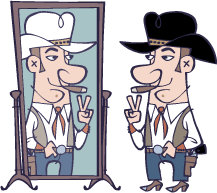
“The good ended happily and the bad unhappily. That is what fiction means.”
—Miss Prism from The Importance of Being Earnest by Oscar Wilde
To own up, that’s one of the things I like about reading detective stories and murder mysteries. The good guys win and the bad guys get caught. Well, usually. Anyway, I like it when wrongdoing is punished. And with fiction the author is in control of the outcome so that’s usually the case.
That’s not true with history where the author has no control. What happened happened. Sometimes the good guys win and sometimes they lose. Except there is one thing about that — who decided who were the good guys and who were bad guys?
Ask yourself, was Alexander the Great a brave, conquering hero or a reckless, subjugating villain. How about Napoleon, or Ghengis Khan? Didn’t all try to conquer the world by force of arms? Is your feeling about each different? I imagine Mongolians view Ghengis Khan a lot differently than Russians do. I guess it all depends on which side you were on.
They say history is written by the winners. Face it, winners don’t like to admit they might be history’s bad guys. Which raises the question, how much of history is just the facts and how much is partisan spin.
“History will be kind to me, for I intend to write it.”
—Winston Churchill
Filed 3/16/11
The False Opposites of the Political Spectrum
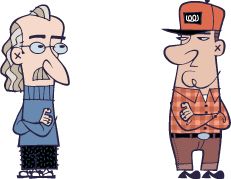
The way people use the terms now-a-days you’d get the idea that liberal and conservative are total opposites. But when you look them up in the dictionary it just ain’t so.
liberal: Having views or policies favoring the freedom of individuals to act or express themselves as of their own choosing.
conservative: Tending to favor the preservation of the existing order and to regard proposals for change with distrust.
Liberal is about individual rights and liberty, no mention of the desire for change. Conservative is an attitude supporting the establishment and resisting change, nothing there about individual freedom. To say the opposite of liberal is conservative is like saying the opposite of free is same.
Say you want to keep the first amendment guarantee of free speech. This would be both conservative (against change) and liberal (pro free speech). There is no contradiction whatever.
Liberal’s true opposite would say the individual’s actions or expressions are restricted or controlled. In other words…
authoritarian: Characterized by or favoring absolute obedience to authority, as against individual freedom.
Conservative’s opposite prefers sweeping changes to the existing order. In other words…
radical: Favoring or effecting revolutionary changes.
This is not to say there is no divide between people who call themselves liberal and people who call themselves conservative. It’s just the conservative and liberal labels they use are muddled up and don’t mean what they really mean. When conservatives call for change they aren’t being conservative. When liberals want to ban, run, or regulate something they aren’t being liberal.
Forget what people call themselves, the proof is in the pudding. Radicals want different pudding, conservatives want the pudding as is. Liberals let you choose your pudding, authoritarians tell you what pudding you must and must not have whether you like it or not. That’s the bottom line, both pudding-wise and otherwise.
Filed 3/11/11
Infrequently Answered Questions
Riddles You’ll Get When You’re Older

Q: How do you get down from an elephant?
A: You don’t get down from an elephant, you get down from a duck.
That was an old riddle my father used to tell me when I was a wee lad. I didn’t get it and he’d never explain it. I couldn’t see what ducks had to do with it when I was on an elephant. Was I using the duck as a stepping stool? It was total nonsense as far as I could tell. I don’t know how old I was when I learned that down was duck feathers so the gag finally made sense.
Here’s the thing, though. I don’t think my dad thought the riddle was all that funny. Rather he was amused I didn’t get the joke. Like how it’s fun to fool folks with a tall tale. Teasing the gullible is fine sport. Unless you’re on the teasing end when it’s annoying. Which leads us to another riddle where not getting it was part of the gag…
“What’s the difference between a zebra and a hat?”
“I don’t know. What?”
“Social security.”
“Social security? I don’t get it.”
“You won’t ’til you’re sixty-five.”
Getting it or not all depends on what it means. Perhaps that should be, what “it” means.
Filed 3/7/11
Oh, Sno-o-o-o-ow!

Ahhh, the joys of home ownership. I just shoveled a foot of home ownership joy off the walk and drive. If you own it you maintain it, that’s part of the deal. Mow the grass, rake the leaves, shovel the snow. It never ends. Know what else never ends, paying for your property.
Even after the mortgage has been paid you’re still not off the hook. Every year you pay property tax, and if you don’t… bye-bye house. Property tax is basically a fee to maintain possession of what you’ve already paid for. It’s like renting your own house from the government. Forever.
Makes you wonder, do you ever truly own your house free and clear?
Filed 2/21/11
When Revolutions Were Circular
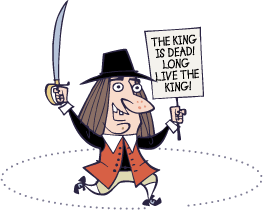
revolution (rĕv′-ə lōō′ shən) noun. 1. a. Orbital motion about a point. b. A single complete cycle of such orbital motion. 2. A sudden political overthrow brought about from within.
While it may not be obvious, the second meaning is derived from the first. Though we tend to think a revolution overthrows the old order and establishes something new or radically different it was first used to mean almost the oposite. That is, a revolution was a restoration of a previous regime or order, a return to the past. That’s what happens when something makes one revolution, it comes full circle and winds up where it began.
Revolution as a political term was first used describing the installment of William of Orange, husband of Mary Stuart, on the throne of England in 1688. This was called the Glorious Revolution where England returned to a Protestant Monarchy replacing the Catholic James II.
Filed 2/16/11
Infrequently Answered Questions
The Entertainment Curve
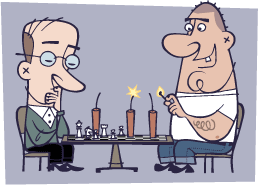
Q: Why can’t I find any entertainment that’s both smart and exciting?
A: Because such a thing does not exist. It’s a universal truth that smart things are dull and exciting things are dumb. However the opposite isn’t always the case, dumb things are not always exciting nor are dull things always smart.
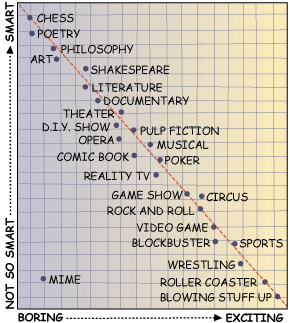
Basically dumb things stimulate the primitive part of the brain and primitives are just highly excitable. That’s why there are soccer hooligans but no chess riots.
Filed 2/5/11
Gell-Mann Amnesia Effect, or Why Should You Believe the News?

Have you ever been watching TV or reading a book and get the sneaking suspicion the writer doesn’t know what they’re writing about? This might happen when the story concerns something you know quite a bit about, your own particular field of work, interest, or study. In my case it’d be the illustration game or to a lesser degree horse racing tracks.
For example, I saw a horse racing movie where a track rat goes up to the betting window and says something like, “A hundred dollars on Dragonfly to win.” Thing is, no experienced gambler places a bet by the horse’s name, they use the number. They’ll say something like, “A hundred to win on the four horse.” Which only goes to show writers are mostly experts at writing and not always what they’re writing about.
The same thing happens with the news. How often have you watched the TV news or read the paper and had the sneaking suspicion the reporters don’t know what they were talking about? Again, usually about a subject you know well. Did you ever then stop and wonder, if they could mess up on this familiar topic how well are they doing on other stories?
Which brings us to the Gell-Mann Amnesia effect. As explained by Michael Crichton:
Briefly stated, the Gell-Mann Amnesia effect works as follows. You open the newspaper to an article on some subject you know well. In Murray’s case, physics. In mine, show business. You read the article and see the journalist has absolutely no understanding of either the facts or the issues. Often, the article is so wrong it actually presents the story backward — reversing cause and effect. I call these the “wet streets cause rain” stories. Paper’s full of them.
In any case, you read with exasperation or amusement the multiple errors in a story — and then turn the page to national or international affairs, and read with renewed interest as if the rest of the newspaper was somehow more accurate about far-off Palestine than it was about the story you just read. You turn the page, and forget what you know.
So, the problem is how can you tell when the news reports on the unfamiliar are full of errors? They say you can’t believe everything you read, but how do you know which parts to believe and which parts to not believe?
Filed 1/26/11
Why You Can’t Convince Some People of Anything
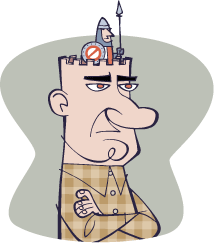
“When the facts change, I change my mind.”
—John Maynard Keynes
If you believe in rationality you might subscribe to that idea. But do folks really act that way? Do people change their opinions when new information comes to light disproving or contradicting what they previously believed? Not as much as you might think. I suggest another saying, or joke, is more likely to be true, and why there’s just no point in arguing with some people…
“Don’t confuse me with the facts, my mind’s made up.”
Filed 1/24/11
Heroes for the Modern Economy
When economic times are tough we need heroes, or we need to be heroes, or we need heroic efforts or something that segways into the premise of this bit. New characters for the television show Heroes with paranormal powers more suitable to real life.

Les Munny who can make ends meet on half his former income.
Emma Surviver who lands on her feet no matter how hard her pocketbook gets hit.
Prudence Pender who can resist the hardest sells that confront her.
Nomar Savens with the ability to live large with a shrinking net worth.
Liv Indared who posesses the superstrength to carry heavy debt.

Holden Green who can freeze excess spending at will.
Penny Pincher with superflexibility to stretch a dollar without breaking it.
Rufus Fallen who has invulnerability to survive a collapsed house market.
Mort Gage with the ability to stay afloat when financially under water.
Hellen Highwater who has the ability to sleep despite it all.
Of course not all the characters use their paranormal powers for good. Heroes has its villians.

Dee Flation with the ability to suck the value out of everyone else’s assets.
Ian Flation with the power to suck the value out of everyone else’s money.
Wally Street-Banks who can transform worthless mortgages into ballance sheet profits.
Robin Depopulus with the power to convert bailout money into personal riches.
Lotta Detts who can’t stop growing bigger and bigger and bigger…
Then there are characters who didn’t make the editorial cut. Mostly because I didn’t know what their powers might be. These are Hope Ann Change, Nada Dime, Bette DeFarm, T. Bill Bonds, Mark Tomarket, and Will Powers. You are welcome to use your imagination, since mine seems to have run dry.
Filed 1/20/11
Impossiblasaurs
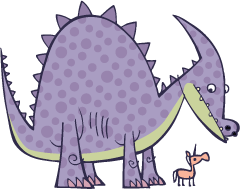
Paleontologists tell us about towering beasts that once roamed the Earth, dinosaurs. Natural history museums prominently display the skeletal remains of the gikgantic creatures assembled like Tinker-toy sculptures. Hollywood has dramatically portrayed the ferocious monsters in numerous blockbusters. There’s one problem, by our current understanding of biology and physics dinosaurs are impossible.
Muscle strength is proportional to size. A muscle two times the diameter of another will be four times as strong. But weight increases even more, a muscle twice the diameter will weigh eight times as much. This relationship limits the size of any animal. Calculations indicate the heaviest elephants of today approach this strength to weight limit.
The largest dinosaurs were many times as big as an elephant. An animal that size wouldn’t even have the muscle strength to stand, let alone walk around. Yet large numbers of unearthed dinosaurs bones show they must have existed. The numerous footprints they left behind showed they walked around on land. On top of that there were elephant-size dinosaurs that flew. Imagine the lift needed for that.
Did dinosaurs have super strong muscles, or were they super lightweight? An elephant of the same weight but four times as tall, and so four times as wide and long, would have 64 times the volume. It’d be full of air, about as dense as a basketball. How would that work? One wonders what happened in evolution so that modern muscles are super weak in comparison. It’s a mystery.
Filed 1/15/11
Created Equal to What?
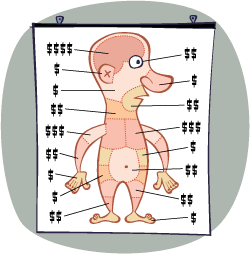
People have calculated the dollar value of a human body, strictly as an academic exercise. If figured on the basic bits, carbon, water, salt and like that, it ain’t much. Maybe less than five bucks. On the other hand, if you base the price on the complex molecular structures like amino acids, testosterone, insulin, etc., it’s worth a lot. Just ask any pharmaceutical company what they charge for steroids.
These are both somewhat missing the point because that’s the dollar value of the raw material, not the body as a person. A person is worth everything they can accomplish over a lifetime, which might be $billions or next to nothing. In which case I suppose some folks can have negative value. Though I’m not naming names.
Basically, that’s what insurance companies evaluate in actuarial tables. It might seem cold-hearted, perhaps, but they do. It’s also how slave traders reckoned a person was worth. In court they apply prices to intangibles like pain and suffering on top of that.
So, what is your body worth? It’s priceless. After all, you literally can’t live without it.
Filed 1/11/11
Doctor, Doctor!
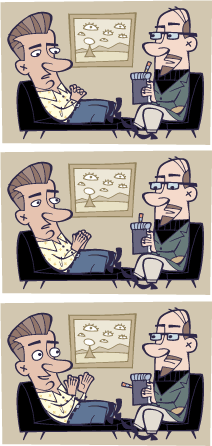





An interactive joke. Click pic and the characters talk. Sort-of. It’s high-tech, easy, fun for everyone!
Filed 1/6/11
Czech Mate

robot (rō′ bŏt) noun. 1. An externally manlike mechanical device capable of performing human tasks or behaving in a human manner. 2. A person who works mechanically without original thought. 3. Any machine or device that works automatically or by remote control. [Czech, from robota, compulsory labor, drudgery.]
Not exactly an obscure word, but one with an interesting derivation. After all, how many english words come from Czech? Did Czechs invent the robot or what? Well, they came up with the word robot.
Our common use of the word comes from a 1920 play RUR by Czech playwright Karel Capek. RUR meaning Rossom’s Universal Robots (in Czech, Rossumovi Univerzální Roboti). Robot simply meaning laborer, or maybe something closer to servant. Sometimes words don’t have exact translations from one language to another. In the play the laborers alluded to in the title were machines, what we now call robots.
Filed 1/4/11